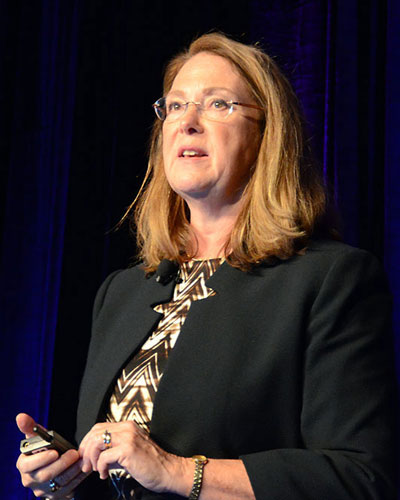PCOM Geriatrics Chair Addresses FDA
May 11, 2017
Dr. Katherine Galluzzi speaks at OMED 2015. Photo credit: American Osteopathic Association
The Food and Drug Administration (FDA) recently held a public workshop to obtain input on issues and challenges associated
with federal efforts to train prescribers on pain management and the safe use of opioids.
The workshop drew insight from a variety of stakeholders on how best to ensure that
prescribers and other health care providers directly involved in the management or
support of patients with pain receive training in pain management and the safe use
of opioids.
Katherine Galluzzi, DO, professor and chair, geriatrics, attended the workshop on behalf of the American Osteopathic Association, and spoke on a panel of health professionals about training and education related
to prescribing opioids for chronic pain. She called pain “a universal experience,”
and stressed the need for education as a way to develop and implement best practices,
and to gain a better understanding of the myriad therapies available for managing
pain. But she also called for a nuanced approach.
“Not every discipline requires the same types of education,” she said. “There is a
minimum level of competency, but it has to be specific to physicians, physician assistants,
nurses and psychologists.”
Dr. Galluzzi noted that many doctors no longer want to prescribe c-2 medications—which
include opioids—because there can be a higher potential for abuse, and physicians
simply don’t want to take on that risk. As a geriatrician, she lamented the effect
it could have on her patient base.
“Instead of limiting the conversation on prescriber education to only opioids, education
efforts should also inform providers and patients alike of the non-opioid and non-pharmacological
modalities available to help alleviate pain, whether prescribed as an opioid alternative,
or in concert with it. This is especially urgent as the population of senior citizens
is the largest, most rapidly growing population,” she said. “Seniors are the ones
who will be having significant, chronic, high-impact pain.”
Dr. Galluzzi is a member of the content development team for the Collaboration for REMS Education
(CO*RE), a consortium that works to create, update and present curriculum modules
that address the FDA’s Risk Evaluation and Mitigation Strategy (REMS) for extended-release
and long-acting (ER/LA) opioid pain medication.
She has also served on a workgroup established by the Centers for Disease Control
and Prevention, which was tasked with reviewing that agency’s proposed opioid prescribing
guidelines.
You May Also Like:
About Philadelphia College of Osteopathic Medicine
Established in 1899, Philadelphia College of Osteopathic Medicine (PCOM) has trained
thousands of highly competent, caring physicians, health practitioners and behavioral
scientists who practice a “whole person” approach to care—treating people, not just
symptoms. PCOM, a private, not-for-profit accredited institution of higher education,
operates three campuses (PCOM, PCOM Georgia and PCOM South Georgia) and offers doctoral degrees in clinical psychology, educational psychology, osteopathic
medicine, pharmacy, physical therapy, and school psychology. The college also offers
graduate degrees in applied behavior analysis, applied positive psychology, biomedical
sciences, forensic medicine, medical laboratory science, mental health counseling,
physician assistant studies, and school psychology. PCOM students learn the importance
of health promotion, research, education and service to the community. Through its
community-based Healthcare Centers, PCOM provides care to medically underserved populations.
For more information, visit pcom.edu or call 215-871-6100.
Contact Us
For general media inquiries, please contact the Office of Marketing and Communications
at 215-871-6300 or communications@pcom.edu. Visit our media relations page to view contact information for public relations personnel.
Connect with PCOM


